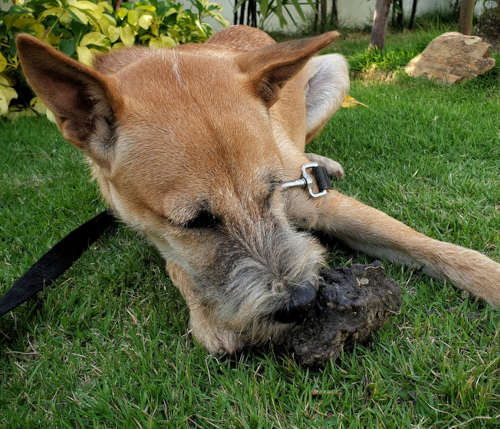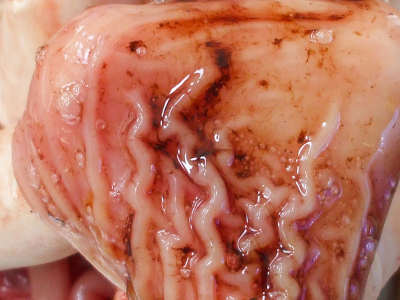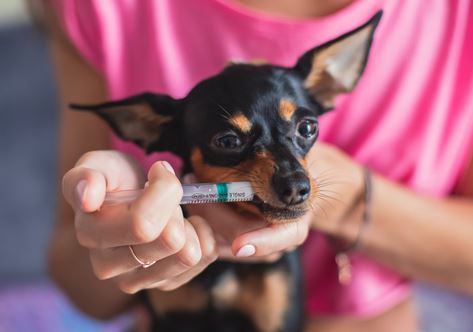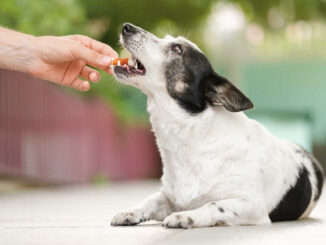
This article was updated on May 26th, 2023
Having practiced as a vet for over 10 years now, I’ve seen my fair share of canine poop issues. One thing that always catches my attention, is when an owner describes their dog’s stool as being ‘black’ or ‘tarry’. A normal poop will be brown in color and dark or black stool can be a red flag in our furry friends.
Black poop, even in a dog who seems well and acts normal, is always something I’m going to take a closer look at. There can be several causes for black stool, so let’s explore what may be going on and what the treatment options are.
Black poop in dogs: the roles of color and consistency
While it may seem like an unpleasant task, keeping an eye on the color and consistency of your dog’s stool each day is a great habit to get into. Becoming familiar with what is normal for them means you should be able to pick up any changes in their stool quickly.
A normal stool should be brown in color and easy to ‘scoop’ up, without leaving any trace behind. There should not be any mucus (slime) or blood within the stool.
When stool is sloppy or watery and contains black, tarry or fresh, red matter, this is something you would want to discuss with your vet promptly.

If my dog shows no other sign of illness, are black stools serious?
Not all causes of black stool will be serious, no. I’ve seen a Labrador puppy who came in with black poop caused by him eating a black crayon the day before!
Many dogs will naturally have darker colored stools and this is of no concern. It is only when they are a pitch-black color, like tar or asphalt, that we need to worry. (1)
However, there is the potential for a serious medical issue, which is why it is sensible to have your dog examined by a professional if you’ve noticed black stool and cannot determine why they have it.
What are the most likely causes of black dog poop? (if a dog is otherwise acting normal)
1. Diet.
It is not surprising that diet will affect the stool. This is often evident in a dog who is raw fed and is ingesting bloody, raw meat, especially liver and other offal. We also see dark stool in dogs who eat things like soil and compost.
It’s a good idea to monitor closely what your dog is eating, and to think back to any recent diet changes. If you do suspect your dog is eating something they should not, consider using a basket muzzle when they’re off lead. Once they are no longer eating the inciting food or material, their stool will quickly return to a normal color.

2. Internal bleeding
When there is bleeding within the mouth, food pipe, stomach or small intestine, the body will digest this blood. Digested blood gives the stool a black and tarry appearance and this is called ‘melena’.
There can be many causes for internal bleeding including gastric ulcers, infections, parasites, toxicities and blood clotting disorders. If blood is detected within the stool your vet will investigate the cause. This can mean a range of tests including blood tests, abdominal imaging and a stool analysis.
Gastric ulcers are often caused by NSAID medication, particularly when used long-term. Interestingly, gastric ulcers won’t always cause obvious bleeding, though they are often the first thing that springs to mind when stool is tarry (1). Learn more about blood in dog’s poop when the dog acts normal (including black tarry poop).

3. Medication
Certain medicines including Pepto Bismol, iron supplements and activated charcoal will all potentially cause black stools short-term. So, it is worth considering if the dog has recently been given any medicine, or was in the vet clinic receiving treatment. Once these medicines are stopped, the stool should return to normal, without intervention.

If your dog is showing other signs of illness, or if you want to read about other causes of black stools, read our article about black stools in dogs.
What you can do at home to help your dog
Once you’ve noticed black stool, you should check your dog over for any other symptoms such as pale gums, a bloated abdomen or weakness.
It is a good idea to schedule a vet visit and to collect a stool sample for analysis. Ideally, we’d want a ‘pooled’ stool sample, which means three small samples from three separate stools. These can be kept together within a clean Tupperware container.
When to be concerned about black dog poop
Black poop is not always a red flag. When there is an obvious explanation (like when a dog just ingested charcoal or soil), we just need to monitor the stool to ensure it returns to normal.
If your dog’s poop is normally formed, not soft or runny, or excessively smelly, or if you just started a new diet or medication, waiting to speak to your vet will usually be fine. If your dog is acting normal and not showing any other signs of illness, you may choose to wait 24-48 hours to see if your dog’s poop becomes normal again. If your dog’s poop is still black after 2 days, make your dog an appointment with their veterinarian.
However, if the stool is tarry and we’re unsure why, or if the dog has other symptoms, this is a concern.
When to visit the vet
Organize a vet visit if your dog has black (not just dark brown) stool and there is no reason you can pinpoint. They should be seen urgently if they have other symptoms including:
• Pale gums
• Rapid breathing
• Abdominal pain or bloating
• Food refusal
• Weakness or lethargy
• A fever
• Vomiting
Treatment options for black dog poop
How we treat black dog poop depends on what is causing it. When it is due to diet or medicine, the dog won’t necessarily need any therapy or interventions.
For something like a gastric ulcer, treatment can include cessation of NSAIDs (if the dog is on them), antacids and Sucralfate. Your vet may also discuss a bland diet that is easy to digest. Medical therapy tend to cost about $50-100, depending on the size of the dog.
Rat bait toxicity is treated with Vitamin K1, which is the antidote. Those with more severe internal bleeding may also require blood products and oxygen (2). When a dog needs to be hospitalized and given blood transfusions, treatment can cost up to $2,000.
Parasites are usually easily treated, with the use of anthelmintics. These can cost as little as $10. Ideally, dogs would be kept up to date with worm prevention, rather than treating them when they have an infestation.
Frequently Asked Questions
• Can a dog’s diet cause black poop?
Absolutely, the diet will affect the color of the stool. Dogs who are raw fed will commonly have darker stool.
• Is it normal for a dog’s poop to change color occasionally?
Yes, as the color of the stool depends on diet, we can see color changes when a dog’s diet is changed.
• Can I treat black dog poop at home?
When you are happy the black stool is caused by diet or medicine, this is something you can manage from home. However, if your dog seems unwell or if you cannot explain why their stool is black, a vet visit should be arranged.
References
1. https://www.vin.com/apputil/content/defaultadv1.aspx?pId=11343&id=5124305&print=1
2. https://vcahospitals.com/know-your-pet/rodenticide-warfarin-poisoning-in-dogs
Disclaimer: This website's content is not a substitute for veterinary care. Always consult with your veterinarian for healthcare decisions. Read More.





Be the first to comment